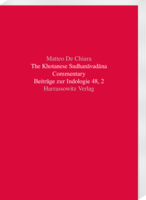|
|
more titles of the subject:
Download:
Please note: With adding digital Products to your cart
the payment will be handled via PayPal. The download will be provided after the payment is confirmed. The Sudhanavadana is a 10th-century poem written in Khotanese, a Middle Iranian Language spoken in Central Asia and used to compile Buddhist works. The agreeable tale relates a previous life of Buddha: that of prince Sudhana and his wife, the fairy princess Manohara. At the core of the work is Sudhana’s journey in search of his lost consort. The poem is preserved in three virtually complete manuscripts and seven fragments all found in Dunhuang. The manuscripts and fragments must originate in a single source, but what remains are two distinct recensions: indeed, it may be assumed that, in order to conform to the needs of different audiences, the story was modified in the course of time to obtain two recensions that still run in parallel but are independent from each other, either one being complete in itself.
This volume marks the completion of the author’s study of Sudhanavadana. It contains the philological commentary on the text and an etymological glossary. The commentary explains the choices made in the critical edition and draws attention to problematic passages. The etymological glossary offers three levels of information: an etymological explanation, the parallels to other Khotanese sources, and etymological propositions on the item in question. Two appendixes contain a list of all loanwords in Sudhanavadana, and a list of all hapaxes. |
|||||||||||||||||||||||||||||||||||||||||






